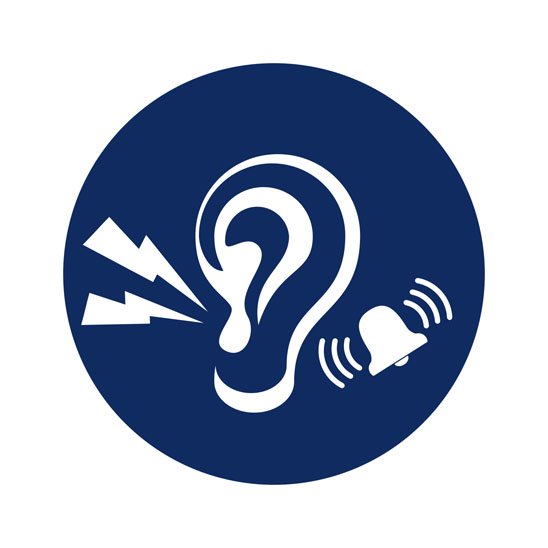
Tinnitus - Symptoms and treatment
Symptoms Causes Treatment Hearing aids for Tinnitus Online Tinnitus Test Book a FREE consultation
Monday - Friday: 8am to 8pm EST
Ringing in the ears (Tinnitus):
What it is
It is a condition which is related to hearing loss.
However, it can have many causes, including exposure to loud noise, aging, ear infections, and injury.
It can also be experienced as hissing, roaring, or buzzing sounds. While there is no direct cure for ringing in the ears, there are several ways that you can reduce the impact it has on your quality of life.
Take a free hearing test at your nearest HearingLife clinic to find out whether you are experiencing tinnitus or hearing loss.Our online test can help you test for tinnitus and understand what you can do about it if you have tinnitus/hearing loss.

Online Tinnitus Test
People with this condition often experience hearing loss too. Our quick online test can help you test for tinnitus and understand what you can do about it if you have tinnitus/hearing loss.
Your result:
Indications of tinnitus and hearing loss
Book a FREE hearing test in a clinic near you
Book FREE hearing test* The result of the test may only be used for guidance. Official conclusions about hearing loss/tinnitus can be provided by our certified hearing care experts.
Your result:
Indications of hearing loss
Book a FREE hearing test in a clinic near you
Book FREE hearing testYour result:
Symptoms of tinnitus indicated
* The result of the test may only be used for guidance. Official conclusions about hearing loss/tinnitus can be provided by our certified hearing care experts.
Your result:
No tinnitus or hearing loss indicated
Your answers indicate that you do not have tinnitus - or that you have non-bothersome tinnitus that is not currently affecting your everyday life. If you experience symptoms of tinnitus in the future, we recommend visiting your local health care provider.
* The result of the test may only be used for guidance. Official conclusions about hearing loss/tinnitus can be provided by our certified hearing care experts.
What causes tinnitus?
Tinnitus, often experienced as a ringing in the ears, can be caused by various factors including loud noise exposure, aging, infections, stress, certain medications, injuries, and other medical conditions. It's typically linked to damage to the inner ear's sensory cells or the auditory nerve. If you're experiencing persistent tinnitus, it's wise to consider a hearing test to understand the underlying cause.
Learn more about the causes of tinnitus.“Tinnitus is any sound that you hear that does not have an external source. Many people will describe it as a whistling, humming or ringing sound,” explains Koebel. ‘It is often a symptom of hearing loss or other damage in the auditory system, and if you are experiencing tinnitus it is important that you have your hearing tested.
Katie Koebel, Audiologist, M.Cl.Sc., Reg. CASLPO
What are the symptoms of tinnitus?
Symptoms of tinnitus typically include ringing, buzzing, or other noises in the ears. These sounds can vary in intensity and may be continuous or intermittent. Tinnitus can also be accompanied by feelings of frustration, anxiety, and stress due to the persistent nature of the sound. If you're experiencing these symptoms, it's essential to consult a healthcare professional for proper evaluation and management.
Learn more about tinnitus symptoms.
Types of tinnitus
It can generally be divided into two types of physical conditions: subjective and objective.
Subjective Tinnitus
The most common form of is subjective. This type involves you hearing annoying whistling/buzzing/high-pitched noises that aren’t really there.
Objective Tinnitus
This type is a rarer form of this condition where your blood vessels or muscles are making noises that are loud enough for you to hear. Your doctor may be able to hear it during your hearing test.
Tinnitus treatment and prevention
While tinnitus doesn't have a cure, managing its effects is possible through various strategies, making it a less disruptive presence in your life. Effective management can transform tinnitus from a bothersome noise to a neutral aspect of your daily experience.
.
Understanding Pulsatile Tinnitus
Pulsatile tinnitus can be a sign of a serious medical condition, and anyone experiencing it should consult their healthcare professional.
It is a unique form of tinnitus characterized by rhythmic sounds resembling one's heartbeat, can be an unsettling experience. While relatively rare, this condition occurs due to various factors, often involving disruptions in blood flow around the ear and auditory system. At HearingLife, we are committed to providing comprehensive and effective strategies to help you reduce pulsatile tinnitus and experience long-term relief.
Exploring Relaxation Techniques for Reducing Pulsatile Tinnitus
In rare cases of pulsatile tinnitus, underlying issues related to blood flow and circulation may contribute to the condition. By integrating relaxation techniques into your daily routine, you can potentially alleviate symptoms and improve your overall well-being. These techniques work by promoting relaxation, reducing stress, and indirectly influencing blood flow patterns. Here are some relaxation techniques to consider:
Deep Breathing Exercises: Practicing deep breathing can help calm your nervous system, reducing stress and promoting healthy blood flow. Inhale deeply through your nose for a count of four, hold for a count of four, and exhale slowly through your mouth for a count of six. Repeat this several times, allowing your body to relax with each breath.
Progressive Muscle Relaxation: This technique involves holding and then gradually releasing different muscle groups in your body. Starting from your toes and moving up to your head, you'll release tension and promote relaxation throughout your body.
Meditation and Mindfulness: Engaging in meditation or mindfulness exercises can help you become more aware of your body and sensations. These practices can reduce stress and potentially improve blood flow over the long term.
Yoga and Tai Chi: These gentle forms of exercise combine movement, breath, and mindfulness, contributing to relaxation and improved circulation.
Long-Term Benefits of Relaxation Techniques
While relaxation techniques may not directly target the underlying causes of pulsatile tinnitus, they can play a significant role in managing the condition and promoting long-term relief. By reducing stress and promoting relaxation, you may experience a decrease in the intensity and frequency of pulsatile tinnitus episodes. Additionally, improved overall well-being and reduced stress levels can contribute to better blood flow and circulation, which may indirectly impact the condition.
Consulting a Professional
If you are experiencing pulsatile tinnitus, it's essential to consult a healthcare professional, such as an audiologist or an ear, nose, and throat specialist (ENT). They can conduct a thorough evaluation to identify any underlying causes and recommend appropriate treatment options. It's important to note that while relaxation techniques can be beneficial, they should be used in conjunction with medical guidance for optimal results.
Sound therapy can provide relief from ringing in the ears
Although sound therapy cannot eliminate this, it can be a helpful tool for managing the symptoms. With sound therapy, you listen to different, carefully selected sounds, which can help you feel that your tinnitus is reduced or temporarily gone.
It then becomes easier to hold your attention away from your condition. Plus, it helps you focus on something more pleasant. You can find the sound therapy that gives you the most effective relief from ringing in the ears by working together with your hearing care professional.
Sound therapy can be provided through:
- Tinnitus masking sound generator devices
- Apps for tinnitus relief
- Sound and sleep apps
- Hearing aids with tinnitus sound therapy features

Do Hearing Hearing Aids Help With Tinnitus?
Hearing aids can significantly reduce the impact of tinnitus by masking the ringing or buzzing sensation. They also offer features like Bluetooth connectivity or white noise options to provide continuous sound, helping to retrain the brain's response to auditory signals. Wearing hearing aids can lower stress levels by ensuring individuals don't miss important sounds, leading to decreased frustration and fatigue. While hearing aids can't cure tinnitus, they offer essential support to alleviate its discomfort.
Learn more about how hearing aids help manage tinnitus.
Consequences of untreated tinnitus
Some tinnitus sufferers become sensitive to places with constant talking or loud music, so they begin to avoid such social situations altogether. To others, it is so disturbing that a full night’s sleep can become difficult to achieve. Tinnitus, if left untreated, can lead to the following consequences:
- Anger
- Concentration problems
- Isolation
- Depression
- Sensitivity to places with constant talking or loud music
- Sleep disorder, insomnia
Some people are able to ignore their condition most of the time, but leaving it untreated can have a negative impact on your life if it is experienced over extended periods of time.
#DidYouKnow?
- Research shows that males are more likely to experience symptoms of tinnitus than females.
- Tinnitus affects millions worldwide, with 1 in 7 adults experiencing some form of it.
- Despite being commonly referred to as a “ringing in the ears,” tinnitus can also sound like buzzing, hissing, or even clicking—often impacting daily life and mental well-being.
- The word tinnitus comes from the latin word ‘tinnire’ which means ‘to ring’.
- An estimated 37% of adult Canadians reported experiencing tinnitus.
- Winter is beautiful, but did you know it can also impact tinnitus? Many people experience heightened symptoms of tinnitus during the colder months.

FAQ about tinnitus
Sources
- Al-Swiahb, J., & Park, S. N. (2016). Characterization of tinnitus in different age groups: A retrospective review. Noise & health, 18(83), 214–219. https://doi.org/10.4103/1463-1741.189240
- Beck D.L. (2012) British Academy of Audiology. Podium presentation.
- https://www.medicalnewstoday.com/articles/321093#how-does-noise-damage-occur
- https://tinnitus.org.uk/support-for-you/what-can-i-do/relaxation/
-
https://www.ncoa.org/adviser/hearing-aids/hearing-loss-statistics/
-
https://www150.statcan.gc.ca/n1/pub/82-003-x/2019003/article/00001-eng.htm





